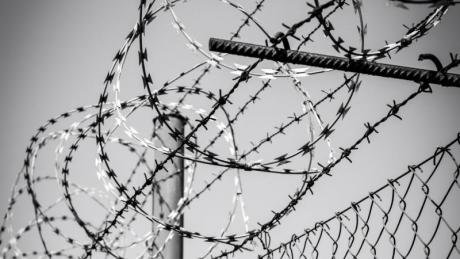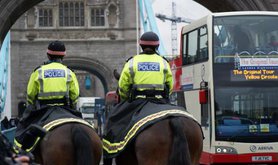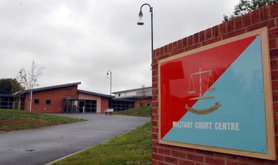
British forces in Northern Ireland used waterboarding and electric shock treatment on detainees during the 1970s, newly uncovered files show. Witness statements and internal Whitehall correspondence released for the first time last month could have significant implications for international human rights law and British-Irish relations.
One victim of waterboarding in Belfast spoke out publicly about his experience for the first time at following the recovery of his original testimony from 1972, which recounts that he ‘felt like I was drowning or suffocating until I fell on the floor unconscious’
The documents were revealed at an event in London to mark the International Day in Support of Victims of Torture on 26 June, hosted by Matrix Chambers, along with the Pat Finucane Centre, the Committee on the Administration of Justice (CAJ) and Amnesty International.
They add to growing evidence that interrogation practices in Northern Ireland went beyond those criticised by the European Court of Human Rights in the 1978 case of Ireland v. the United Kingdom. The so-called ‘five techniques’ examined in that judgement included deprivation of sleep, deprivation of food and drink, stress positions, hooding and subjection to ‘white noise’.
Although the European Court condemned these practices as ‘inhuman and degrading’ it refused to describe them as torture. This paradoxically opened the way for the ruling to be used as a blueprint by interrogators, notably in the ‘torture memos’ drafted by the Deputy Assistant Attorney General of the US John Yoo to justify practices used during the earliest phase of the ‘War on Terror’.
Previous revelations regarding the suppression of medical evidence in 2014 prompted the Irish Government to re-open the original case. The discovery that interrogation practices went beyond the five techniques, and included waterboarding and electric shock treatment, is likely to increase pressure on the European Court to alter its original verdict. In February this year, Channel 4 news covered allegations that British paratroopers had used waterboarding against two Irish men, with the knowledge of then Prime Minister Edward Heath. The latest revelations show the practice was not a one-off.
The re-opened legal case – which still awaits a ruling from Strasbourg – has been the subject of significant tension in British-Irish relations, now under further pressure given negotiations over Brexit and reforming the Northern Ireland Executive. A stronger line from the European Court would also be embarrassing for a British Government who have just agreed a DUP demand that bodies examining the legacy of the conflict should not 'unfairly focus on former members of the armed forces or police.'
At last month’s Matrix Chambers event, witness statements from the closed archive of the of the Association for Legal Justice at the Ó Fiaich Library in Armagh were revealed for the first time as well as newly uncovered material from the UK National Archives.
An anonymous former detainee read an extract from his own newly recovered testimony given in 1972 when he was aged 17. He stated that in between beatings and other abusive techniques at Black Mountain Army Base “they wrapped a towel round my head and poured water all over it.”
“As it filled with water, it felt like I was drowning or suffocating until I fell on the floor unconscious. Once I was conscious they would then beat me again with batons until I was on my feet and repeated the process again. I lost a stone in weight in seven hours and my clothes were ripped to shreds. Finally an army officer came in. I had met him before. He said he believed that I wasn’t involved, but he felt that I could give him information on the IRA, and he would give me one week to do so. He drove me back to the Springfield Road and threw me out.”
A statement given by the same detainee’s mother to a Cork-based NGO in November 1972, described how, during his detention “he was brutally beaten and had a wet towel tied tightly round his head and face.
“This was filled with water at intervals causing him great distress and suffocation. His body was doubled over causing him extreme pain. He was also forced to hold an armalite rifle and a .22 calibre pistol to have his fingerprints on them, and was told this was enough to get him 15 years.”
“When my son arrived home I was so distressed by his appearance that I decided to send him away for his own safety. He was completely changed in his personality from a happy-go-lucky boy to a very frightened one.”
Other accounts of a similar pattern of torture included a Downing Street memo from November 1972 recording the concerns of Taoiseach Jack Lynch, and a Ministry of Defence file recommending settlement of a case brought by a detainee subjected to electric shock treatment. Paul O’Connor of the Pat Finucane Centre said the file was clear evidence that the MOD was anxious to keep certain matters out of court, “particularly issues involving the use of water, and people’s heads being held under water, and electric shocks being administered.”
O’Connor criticised the response of the Ministry of Defence and the Police Service of Northern Ireland to advance reports of the new evidence. “Both responses were that anybody that had allegations of serious criminal wrongdoing should approach the police, who are implicated in the wrongdoing. “
Daniel Holder of the Committee on the Administration of Justice said that evidence interrogation methods that went beyond the five techniques was significant for the European Court case.
He added that previous revelations had already shown that the original court decision was influenced by misleading information provided by the British Government: “It knew what the real long-term impact of these techniques were. It’s there in the archives. They had real medical reports as well as the misleading ones that were presented before the court.”
Ann Hannah of Freedom from Torture argued that accountability for such practices was essential to the long-term rehabilitation of victims. “Time and time again we see the idea that you can rebuild after conflict and achieve some form of stability or you can have accountability. These things are so commonly played off against each other. In reality of course, stability is fragile without some form of accountability.
“How can you expect survivors and their communities to trust state institutions like the police, the army, their politicians, if there’s been no attempt at accountability? Reconciliation is a buzzword in these situations but all too often survivors of torture and other abuses are just completely ignored in that process.”
Guardian journalist Ian Cobain, author of Cruel Britannia: A Secret History of Torture warned of a significant backlash from the Ministry of Defence against such legal challenges.
“We British are not any more prone than other former colonial powers to resort to torture at times of emergency. We probably compare quite favourably to some other states in that respect, but what we are particularly good at is concealment. We are really good at using official secrecy, denial and obfuscation to keep it all really well hidden.”
“The reason a lot of British people tell themselves that [we behaved better than other colonial powers] is because denial and official secrecy has cleared the space within which this very powerful myth flourishes. I suspect one of the reasons why the Ministry of Defence is so keen to shutdown post-conflict litigation is because it is challenging to this ideal that we Brits have about ourselves.”
A recent YouGov poll, showing that 59 per cent of are proud of the British Empire, perhaps underlines Cobain’s point. One consequence of that narrative may be an international legal order that allows other powers to emulate the empire’s torture practices.
Read more
Get our weekly email




Comments
We encourage anyone to comment, please consult the oD commenting guidelines if you have any questions.